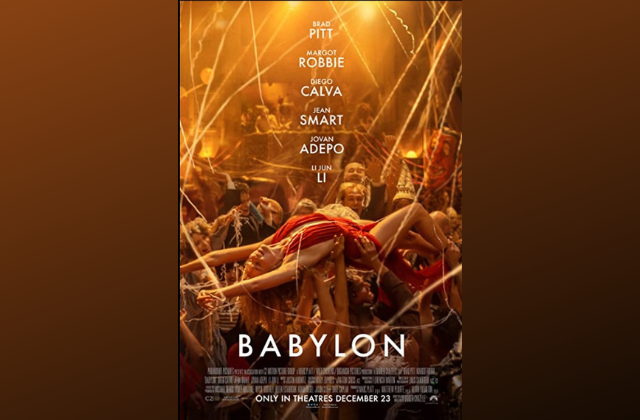Revisionist history isn’t just for holocaust deniers. In Hollywood, filmmakers such as Quentin Tarantino (“Once Upon a Time in Hollywood…”), Ryan Murphy (“Hollywood”), and even Steven Spielberg (“The Fabelmans”) have been taking liberties with Tinsel Town mythology, incorporating real and fictional characters to tell stories.
However, nothing matches the excesses of “Babylon” (Paramount), Damien Chazelle’s celebration of Hollywood’s excesses. Chazelle, who already delved into Hollywood in “La La Land” returns to the scene of the crime, and this time loses control just like most of the characters in “Babylon.” Essentially a partial revisionist retelling of “Singin’ in the Rain,” “Babylon” is all wet.
Beginning in Bel Air, California in 1926, “Babylon” opens with Manny (hot Diego Calva), a low-level movie studio employee, tasked with delivering an elephant to a party thrown at the lavish estate of a movie studio exec. The disgusting sequence involving the elephant is an early indication of what’s to come.
At the party, he encounters Nellie LaRoy (Margot Robbie), a wannabe drug-fueled starlet, who goes from being the center of attention on the dancefloor to landing a role in a silent picture being shot at Kinoscope Studios, directed by Ruth Arzner (Katherine Waterston), based on lesbian director Dorothy Arzner.
Over the course of the excessive three hours and eight minutes runtime, Nellie and Manny ride the fame roller coaster. Nellie, managed by her father Robert (Eric Roberts), earns a reputation for her ability to cry on cue, as well as being a substance-abusing, gambling-addicted nightmare. Enduring the transition from the silents to the talkies, she constantly gets in her own way, self-sabotaging her blossoming career.
Regardless, Manny is in love with her, warts and all, and ends up rising through the ranks to become a studio executive. First, he must survive his initial interaction with Hollywood heartthrob Jack Conrad (Brad Pitt). Once he passes that test, his ingenuity and desire to succeed earn him a place of honor and respect among his peers. Ultimately, his obsession with Nellie leads to one of the darkest nights in his young life. The terrifying sequence involving loan shark McKay (Tobey Maguire) and a man who eats live rats in the bowels of the desert will stick with you, even if you’d rather it didn’t.
Chazelle also makes an effort to include other racially-driven storylines in addition to Mexican-immigrant Manny’s. There’s queer Asian actress Lady Fay Zhu (Li Jun Li) based on Anna May Wong with a touch of Marlene Dietrich. Additionally, the section about black jazz musician-turned-movie-star Sidney Palmer (Jovan Adepo) attempts to deal with race and prejudice with mixed results. But Chazelle takes an uncomfortable wrong turn during one of the characters’ anti-Semitic rants during a movie shoot.
The mix of real (Irving Thalberg portrayed by Max Minghella) and fictional (Lukas Haas as producer George Munn, and gossip columnist Elinor St. John, played by Jean Smart, based on Adela Rogers St. John) characters feels contrived. Also distracting is Justin Hurwitz’s score, parts of which sound lifted from the music he composed for “La La Land.”
“Babylon”’s conclusion in a Los Angeles movie theater in 1952, where “Singin’ in the Rain” is showing, devolves into a misguided acid trip, giving us the impression that Chazelle simply had no idea to end the movie.
Rating: D
Gregg Shapiro is the author of eight books including the poetry chapbook Fear of Muses (Souvenir Spoon Books, 2022). An entertainment journalist, whose interviews and reviews run in a variety of regional LGBTQ+ and mainstream publications and websites, Shapiro lives in Fort Lauderdale with his husband Rick and their dog Coco.



